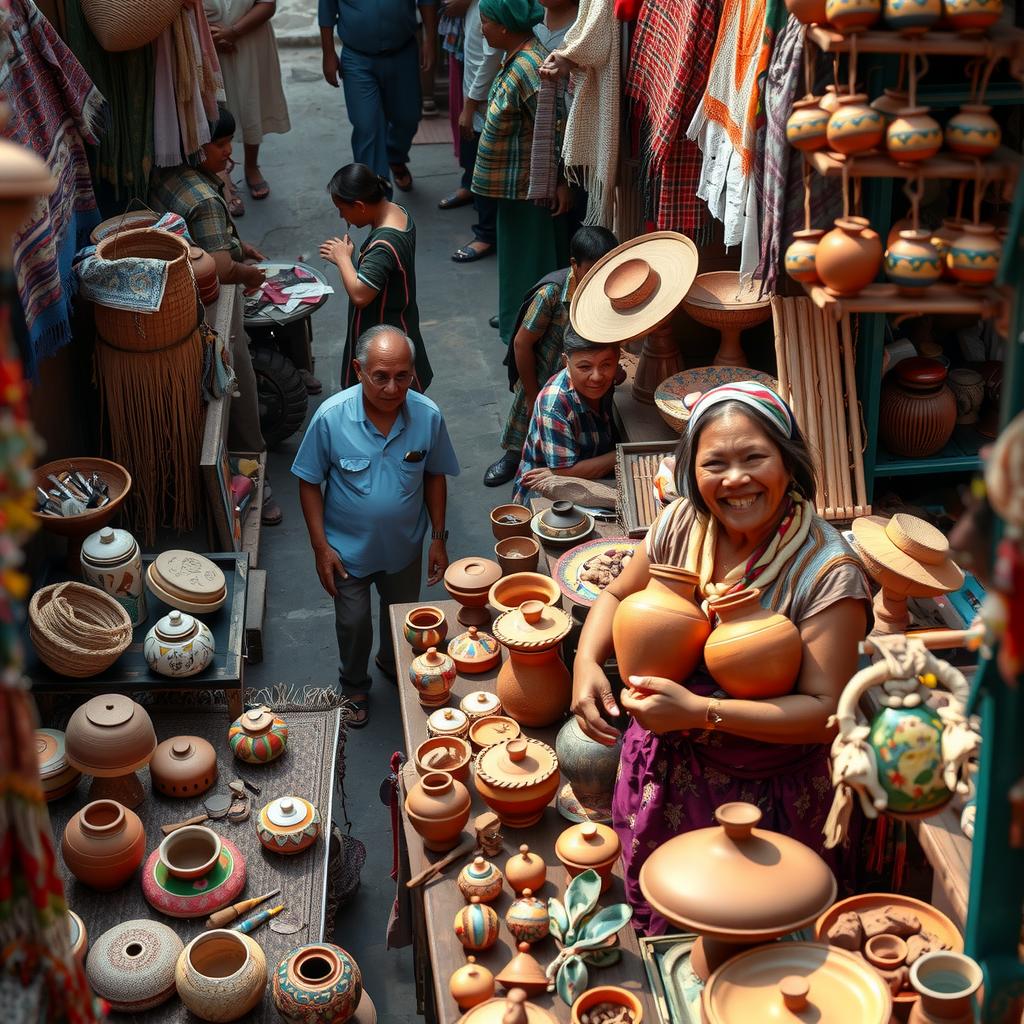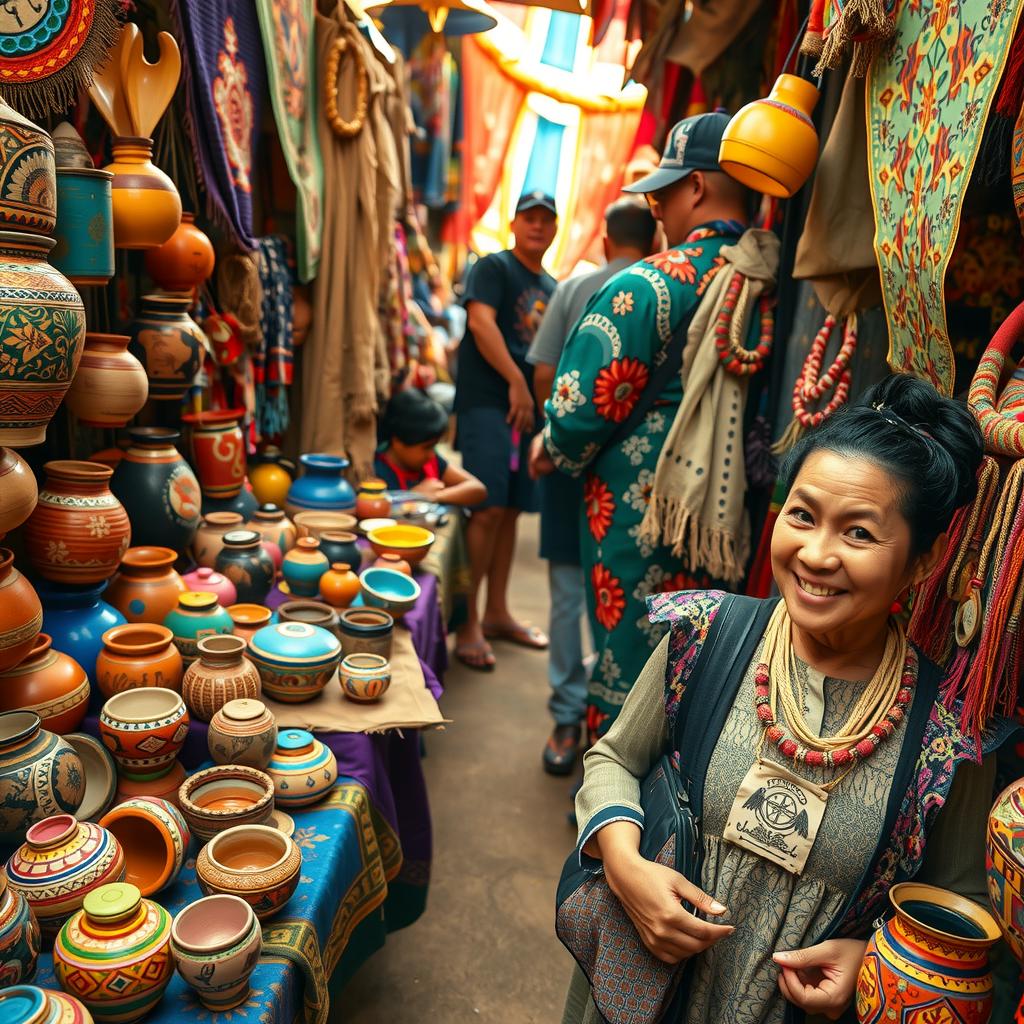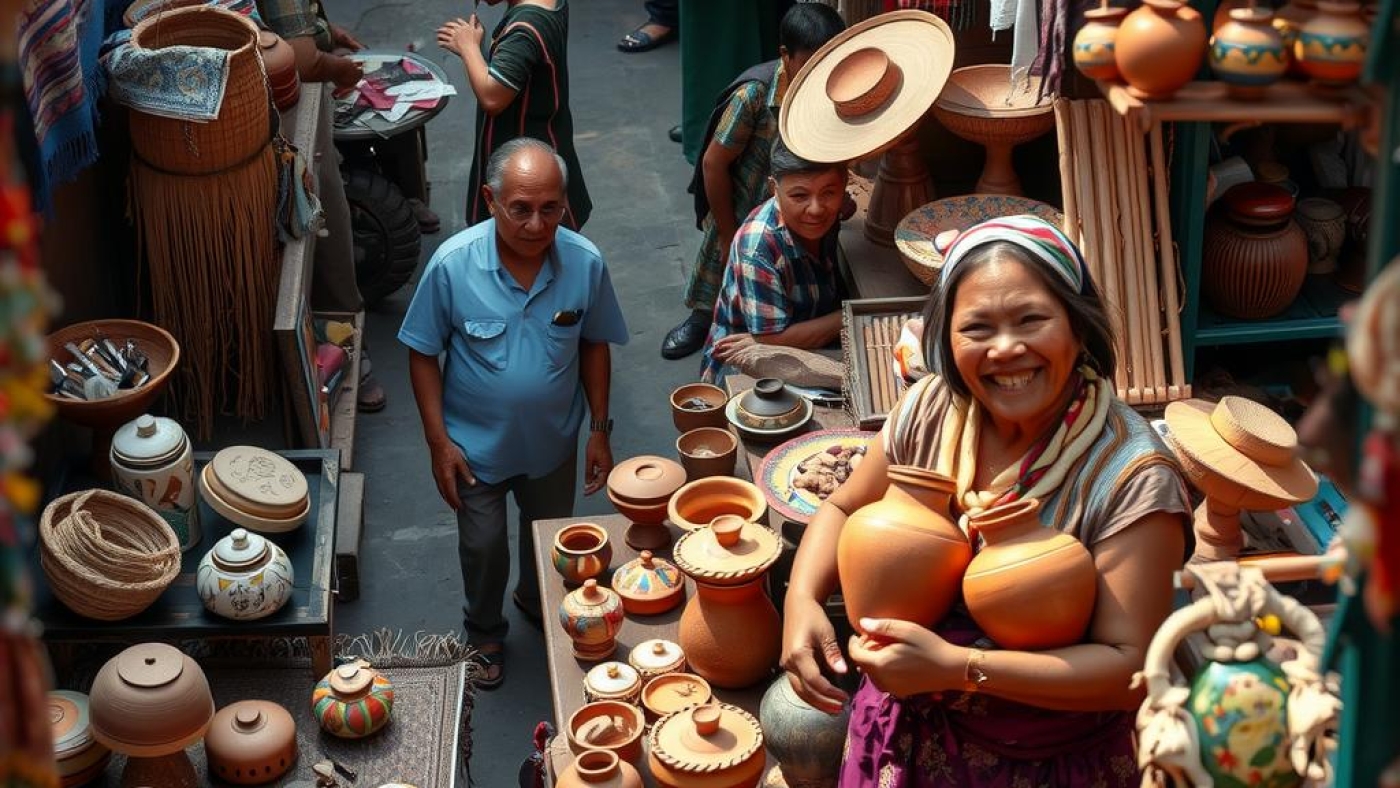In an era where travel and tourism increasingly intersect with ethical considerations, the question of how to choose souvenirs that respect and support indigenous communities becomes paramount. Tourists often find themselves in a moral quandary: how can one bring back a piece of culture without contributing to its commodification or exploitation? The growing awareness around responsible tourism calls for travelers to reflect on their purchasing choices, ensuring they do not unintentionally undermine the very cultures they seek to appreciate. This blog post serves as an essential buying guide, offering insights into selecting ethical souvenirs that prioritize cultural preservation, community support, and fair trade practices.
As global citizens venture into diverse locales, it is crucial for them to understand the impact of their purchases on local economies and traditions. Many artisans from indigenous backgrounds pour their heart and soul into creating unique crafts that tell stories passed down through generations. However, without mindful consumption habits, these creations risk becoming mere trinkets devoid of significance. By fostering connections with local artisans who adhere to sustainable practices, tourists not only procure meaningful gifts but also contribute positively to the livelihoods of indigenous peoples.
This guide aims not only to inform readers about what constitutes an ethical souvenir but also encourages deeper engagement with local cultures through respectful interactions and understanding. Highlighting various aspects such as craftsmanship authenticity, environmental sustainability, and economic fairness will empower travelers in making responsible choices while shopping abroad. Ultimately, this journey towards more conscientious buying habits aligns perfectly with broader goals like cultural appreciation—ensuring that each purchase supports rather than exploits.
Through this lens of mindfulness and respect for diversity, readers will discover practical tips on identifying ethically sourced items while navigating potential pitfalls in souvenir shopping. With every thoughtful selection made during travels—whether it’s handmade textiles or traditional art pieces—tourists play a pivotal role in safeguarding traditions against erosion by globalization’s relentless tide. Dive into this exploration of ethical souvenir buying; together we can cultivate a world where tourism harmonizes with cultural integrity instead of overshadowing it.

Key Insights:
-
Understanding Ethical Souvenirs: A guide to recognizing what defines an ethical souvenir, emphasizing the importance of supporting indigenous communities. This segment will explore how genuine artisanal products contribute to cultural preservation and economic sustainability, distinguishing them from mass-produced alternatives that risk diluting authenticity.
-
Navigating Fair Trade Practices: Insight into fair trade practices that empower local artisans is essential for responsible tourism. This section encourages travelers to seek out sustainable gifts that foster community support while ensuring that their purchases directly benefit the creators, thus creating a more equitable marketplace for unique crafts.
-
Promoting Cultural Preservation through Purchases: Highlighting the role of conscious consumerism in promoting cultural integrity, this part focuses on how each purchase can enhance lives within indigenous communities. By prioritizing items made with traditional techniques and materials, consumers can play a pivotal role in safeguarding rich heritages while enjoying meaningful travel experiences.
Each insight emphasizes not only the act of buying but also its broader implications on community welfare and cultural sustainability within indigenous communities.

The Significance of Ethical Souvenirs
Preserving Culture Through Thoughtful Choices
In today’s globalized world, the concept of ethical souvenirs has gained substantial attention, particularly in relation to their role in supporting indigenous communities. These souvenirs are not merely trinkets but represent cultural heritage and craftsmanship that have been passed down through generations. When travelers choose ethical souvenirs, they engage in a form of responsible tourism that prioritizes cultural preservation over mass-produced items often made without regard for authenticity or the welfare of local communities. By purchasing these products, consumers can ensure that their money directly benefits indigenous artisans and helps maintain traditional practices. This support fosters economic stability within these communities, allowing them to thrive while keeping their unique cultures alive. For instance, handcrafted items reflect the skills and stories embedded within each piece—much more than mere decorative objects; they serve as tangible links to history and identity.
Community Welfare Through Responsible Choices
Empowering Artisans with Fair Trade Practices
The journey towards understanding ethical souvenirs is incomplete without recognizing the importance of fair trade practices. Ethical shopping means being aware of where products come from and how they are made—a consideration central to promoting community welfare among indigenous populations. Buying fair trade ensures that artisans receive fair compensation for their work, which not only uplifts individual creators but also strengthens entire communities economically and socially. Moreover, this practice encourages sustainable gift-giving by minimizing exploitation associated with conventional souvenir markets dominated by large corporations that prioritize profit over people’s well-being. Supporting local economies through responsible choices allows indigenous artisans to invest back into their crafts, enhancing both product quality and community resilience against external pressures such as globalization or environmental degradation.
Cultural Integrity: A Collective Responsibility
The Role of Tourists in Sustaining Heritage
Tourists play an essential role in maintaining cultural integrity when it comes to purchasing souvenirs during their travels. Understanding the impact behind every purchase leads one toward a more conscientious approach—where every item bought serves not just as a memento but also supports a story worth telling about its origins and significance within an indigenous context. By opting for ethically sourced products over mass-produced alternatives often found at tourist traps, individuals help reinforce cultural narratives rather than dilute them through commercialization aimed solely at profit-making without regard for genuine representation or respect for traditions involved in crafting those goods. Furthermore, tourists who embrace this mindset contribute positively towards raising awareness about issues like cultural appropriation; thus fostering deeper connections with people from different backgrounds while respecting their heritage—a vital aspect of global citizenship today.
Understanding Handcrafted Authenticity
The Essence of Indigenous Artistry
In a world increasingly dominated by mass production, the beauty and significance of genuine handcrafted items lie in their authenticity. These items are not merely products; they embody the culture, traditions, and stories of indigenous communities. When seeking to differentiate between authentic craftsmanship and imitation goods, it’s essential to understand what makes an item truly unique. Often, genuine ethical souvenirs are created through traditional techniques passed down through generations, while imitations tend to lack depth and cultural significance. One key indicator of authenticity is the presence of intentional imperfections—handmade pieces often carry unique marks or variations that reflect individual artisans’ skills. By investing time in learning about these characteristics, consumers can engage in responsible tourism that supports local economies rather than contributing to exploitative practices associated with mass-produced alternatives.
The Significance of Cultural Preservation
Supporting Indigenous Communities Through Art
Supporting indigenous artistry goes beyond mere appreciation—it plays a crucial role in cultural preservation. Each handcrafted item tells a story rooted in tradition; therefore, purchasing such works directly impacts the livelihoods of artists from these communities. As consumers recognize the value behind these creations, they contribute to community support, ensuring that important cultural practices endure amidst globalization pressures. For instance, when individuals choose sustainable gifts crafted by local artisans over generic items found in department stores, they help maintain vital artistic skills within indigenous populations while fostering respect for diverse cultures. This conscious decision-making aligns with principles like fair trade practices, which advocate for equitable compensation for creators while promoting environmental sustainability—a win-win scenario that benefits both buyers and makers alike.
Recognizing Quality Over Quantity
A Buying Guide for Conscious Consumers
To successfully navigate the marketplace filled with both authentic handmade goods and mass-produced replicas requires discernment—as well as knowledge provided by a solid buying guide focused on quality over quantity. First-time buyers might consider asking questions regarding materials used or production methods employed by artisans before making purchases; this inquiry fosters deeper connections between consumers and creators alike while encouraging transparency within commercial exchanges related to indigenous arts. Additionally, inspecting labels or certifications can offer insights into whether products comply with ethical standards set forth by organizations dedicated to promoting responsible sourcing practices across global markets—an invaluable step toward ensuring one’s contributions positively impact vulnerable communities facing economic challenges due mainly due exploitation from larger corporations interested primarily profits rather than people’s welfare.
Embracing Sustainable Tourism Practices
The Role of Responsible Purchasing Decisions
Engaging with authentic handicrafts has significant implications not only for supporting artists but also for promoting responsible tourism initiatives aimed at preserving natural resources alongside rich heritages inherent various regions worldwide—the very essence driving many travelers today towards more mindful experiences abroad! By intentionally choosing ethically sourced artisan-made goods during travels (e.g., wooden carvings from Peru), visitors can partake actively combating detrimental effects stemming rampant consumerism prevalent globally whilst simultaneously enjoying meaningful interactions locals who share their talents generously through art forms steeped rich history—that is indeed priceless! Ultimately embracing sustainable options empowers tourists explore beautiful destinations responsibly without compromising integrity surrounding true craftsmanship existing them—and fosters lasting bonds formed enriched shared values together celebrating humanity diversity showcased vibrant tapestry woven throughout cultures around globe uniting us all under umbrella creativity compassion understanding each other better ever before possible!
Understanding Ethical Shopping in Travel
Exploring the Intersection of Integrity and Local Cultures
When venturing into new destinations, ethical shopping practices become essential for travelers who wish to respect local cultures while enriching their own experiences. Engaging with indigenous communities through responsible purchasing not only supports local economies but also fosters cultural preservation. Tourists are encouraged to consider how their purchases impact these communities; opting for items that reflect authentic craftsmanship rather than mass-produced souvenirs helps sustain traditional arts. For those looking for a concise buying guide, focusing on sustainable gifts made from locally sourced materials can lead to more meaningful interactions with artisans and locals alike.
The Importance of Fair Trade Practices
Supporting Communities Through Thoughtful Purchases
The concept of fair trade practices plays a pivotal role in ensuring that artisans receive fair compensation for their work, thus promoting economic stability within their communities. By choosing products labeled as fair trade, travelers contribute directly to community support initiatives, empowering individuals and families who rely on these trades for their livelihoods. Purchasing ethically sourced goods not only enhances one’s travel experience but also provides an opportunity to learn about the stories behind each product. This engagement creates connections between tourists and locals, fostering greater understanding and appreciation of diverse cultures.
Responsible Tourism: More Than Just Sightseeing
Enhancing Your Travel Experience While Being Mindful
Responsible tourism embodies the idea that every traveler has a role in preserving the environments they visit and respecting the people they meet along the way. By incorporating ethical shopping habits into travel itineraries, visitors can ensure that their spending aligns with values such as sustainability and community welfare. When exploring markets or artisan fairs, looking out for vendors who prioritize eco-friendly practices is crucial; this includes seeking out items crafted from recycled materials or organic resources. Such mindful approaches not only yield unique treasures but also bolster efforts toward environmental conservation.
Cultural Preservation Through Thoughtful Consumption
Balancing Modernity With Tradition
Cultural preservation hinges on recognizing the importance of maintaining traditions amidst globalization’s rapid pace. As tourists navigate various marketplaces around the world, it is vital they choose products that honor local customs rather than undermine them through exploitation or imitation. Items like handwoven textiles or handcrafted jewelry serve dual purposes: they allow travelers to take home tangible memories while simultaneously supporting artists dedicated to keeping cultural narratives alive through their craft. Ultimately, when consumers make educated decisions regarding what they buy—prioritizing authenticity over convenience—they contribute positively towards sustaining vibrant global heritages.
In summary, embracing responsible purchasing habits during travels enriches personal experiences while benefiting local ecosystems and cultures alike—making it imperative for modern-day explorers to shop ethically wherever possible.
Frequently Asked Questions:
Q: How can travelers ensure their souvenirs are ethically sourced from indigenous communities?
A: Travelers can ensure that their souvenirs are ethically sourced by researching the artisans and businesses they purchase from. Look for vendors that practice fair trade and prioritize transparency in their sourcing methods. Engaging with local artists directly or seeking recommendations from reputable organizations dedicated to supporting indigenous communities can also guide consumers toward authentic, culturally significant items.
Q: What distinguishes an ethical souvenir from a mass-produced item?
A: An ethical souvenir is typically handcrafted by members of the community it represents, reflecting unique cultural traditions and practices. In contrast, mass-produced items often lack authenticity and may exploit cultural symbols without proper acknowledgment or benefit to the community. By choosing products that exhibit craftsmanship rooted in local heritage, travelers support both cultural preservation and sustainable economic development.
Q: Why is responsible tourism important when purchasing gifts during travel?
A: Responsible tourism emphasizes the impact consumer choices have on local economies and cultures. When travelers buy items that align with principles of sustainability—such as supporting local artisans through purchases of sustainable gifts—they foster community support while helping to protect traditional ways of life. This approach not only enhances visitors’ experiences but also ensures that each transaction contributes positively to the lives of those within indigenous communities.
